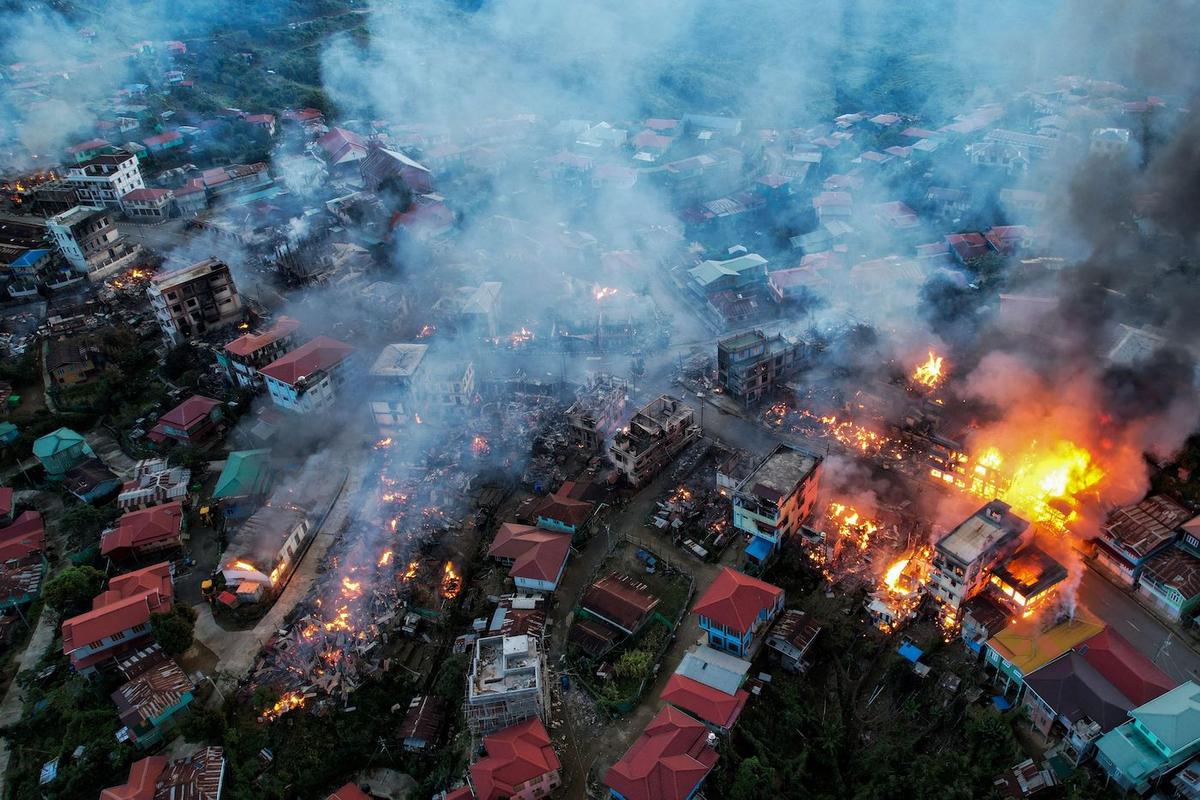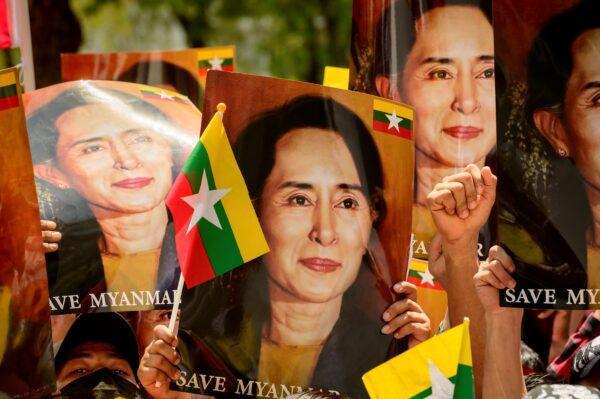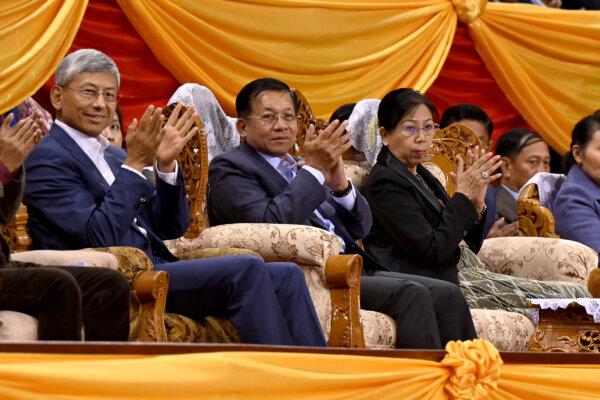Bin Zhao, Grace Hsing and Michael Zhuang

Myanmar, also known as Burma, is a key participant in China’s “Belt and Road Initiative.” The country has been ruled by a military junta that deposed an elected government in 2021. The civil war between the military junta and numerous resistance and regional militant groups has escalated ever since.
On Nov. 13, the Myanmar National Democratic Alliance Army (MNDAA) attacked Rathedaung and Minbya, and took over the towns from the ruling military junta, sending thousands of civilians into neighboring India. The military-backed President of Myanmar has said that the government forces failed to defeat the rebels and therefore, Myanmar is on the verge of breaking up.
Heavy fighting has been raging in northern Myanmar, which is next to China. Since the end of October, the MNDAA has joined forces with the Arakan Army and the Ta’ang National Liberation Army in a coordinated offensive against the Burmese military junta. The alliance has claimed widespread victories, and the military junta has acknowledged that it has lost control over three towns in the northern part of the country.
An insider close to the MNDAA told The Epoch Times that the Chinese Communist Party (CCP) is behind the MNDAA’s offensive in northern Myanmar and that the CCP's goal is to regain overwhelming influence over Myanmar.
In early October, the CCP sent its engineers into Myanmar to survey the planned railroad line which is a part of the Belt and Road Initiative, seeking to accelerate its construction. The progress of the project has yet to be satisfactory to the CCP, which is now seeking to boost its influence over Myanmar.
Historic Ties Between the CCP and Burmese Separatist Groups
The Burmese military has historically played an important role in the politics of Myanmar. Having taken over the country in 1962 in a coup, the Burmese military established a self-proclaimed socialist regime under a military junta, where violent repressions of protests and fraudulent elections frequently took place.
In the 2010s, the Burmese military allowed democratic reforms to take place, which led to the landslide victory of Aung Sang Suu Kyi and her pro-democratic alliance in 2015. However, the country returned to the military junta in 2021 after another coup. The military takeover led to massive protests and an escalating civil war. The Chinese communist regime warmed up immediately to the military junta and massively increased its investments in Myanmar.

A protester holds a sign with an image of detained civilian leader Aung San Suu Kyi as they prepare to face off against security forces during a demonstration against the military coup in Yangon, Burma, on March 5, 2021.
Apart from the power struggle between the Burmese military and Aung Sang Suu Kyi’s pro-democratic wing in Myanmar’s political arena, other factions are the regional ethnic militant groups such as the MNDAA, which has existed since 1989 and has controlled the Kokang region in the northern part of the country.
The MNDAA was formerly a part of the Communist Party of Burma and historically has enjoyed significant support from the Chinese regime. Its current leader is Peng Daxun, whose father Pheung Kya-shin received training and military assistance from the CCP before founding the MNDAA. The Burmese military junta recognized the autonomy of the Kokang region under the MNDAA in 1989 after years of conflict and turmoil, and Mr. Pheung became the leader of the Kokang region. The Kokang region was essentially another authoritarian regime under Mr. Pheung and the MNDAA, which was backed by China.
In 2009, conflict broke out between the Burmese military and Mr. Pheung's Kokang army, resulting in a split in Mr. Pheung's camp. Mr. Pheung's older alliances turned against him and defected to the Burmese military, Mr. Pheung’s forces were defeated, and he retreated to China, where he was resettled by the CCP until his death in February 2022.
Mr. Pheung's older allies became warlords that controlled the Kokang region, engaging in criminal activities such as wire fraud and illegal gambling. The region was essentially a mafia state. Currently, the MNDAA is led by Mr. Pheung's son, Peng Daxun, and he is leading the MNDAA back in Myanmar from China in the name of "eradicating the extortionist mafia" to reclaim his father's territory.
Recently, an insider, Zhang Zheng (pseudonym), who is close to the top of the MNDAA, spoke to The Epoch Times, "The CCP is behind the return of the alliance (MNDAA) to Myanmar, and the CCP aims to restore its 'absolute influence' over Myanmar."
Mr. Zhang explained that Mr. Pheung's older alliances that emerged in northern Myanmar after Mr. Pheung was driven out of the country were still under the influence of the CCP, but in recent years, these factions have become wealthy through telecommunication fraud and gambling, and are gradually moving away from China economically. As its influence declines, the CCP has been worried that it might be at a disadvantage in the geopolitics of Myanmar.
On one hand, the CCP has warmed up to Myanmar’s military junta and invested heavily in Myanmar through its Belt and Road Initiative. On the other hand, the CCP historically supports separatist militant groups in northern Myanmar who exerted significant influence in that region.
In early May, when China's then-foreign minister Qin Gang visited Myanmar, mass protests broke out in many parts of the country to express their dissatisfaction with the CCP's cozy relationship with the military junta.
'Belt and Road' Projects in Myanmar
In 2018, China and Myanmar announced the China-Myanmar Economic Corridor (CMEC) as a part of the CCP’s Belt and Road Initiative. The project plans to build natural gas and crude oil pipelines between China and Myanmar as a part of China’s energy policy, with a total investment of US$2.54 billion.

Myanmar's military chief Min Aung Hlaing (center) along with his wife (right) and China's ambassador to Myanmar Chen Hai (left) attend a ceremony on the eve of the Lunar New Year, in Yangon on Jan. 21, 2023.
An important part of the CMEC is the Kyaukphyu Port and Special Economic Zone in Myanmar, which China acquired the right to operate in 2018. The port is located in the Indian Ocean and is the starting point for the China-Myanmar oil and gas pipeline.
Oil and gas shipped from the Middle East to China through Kyaukphyu Port can choose to avoid the traditional sea routes of the Strait of Malacca and the South China Sea. This has become an important part of the CCP’s economic and military strategy.
At the same time, the CMEC also plans to build a railroad that would start in Yunnan, China, and run to the Kyaukphyu Special Economic Zone.
The Irrawaddy, an independent Burmese media outlet, reported that in early October, Chinese engineers began work on a railroad project by surveying lines in various parts of the country. The report quoted a civilian organization employee saying, "Chinese engineers are surveying the lines of the railroad, and everything is being done in secret under [Burmese] military protection. So the Chinese can do whatever they want."
On Oct. 31, China’s Minister of Public Security Wang Xiaohong traveled to Myanmar and met with Min Aung Hlaing, the Burmese army general who is the de facto ruler of the country. Mr. Wang expressed his hope that the two countries would speed up the implementation of key projects under the Belt and Road Initiative and strengthen cooperation in areas such as security and infrastructure projects. Mr. Min responded by saying that he was willing to cooperate with China.
The Epoch Times insider Zhang Zheng said of the situation, "With the CCP's diminishing influence in Myanmar, the CCP's promotion of the Belt and Road projects in Myanmar had stagnated. As the world is focused on the conflict in Israel, the CCP is now supporting the [MNDAA's pro-China] Pheung family to regain the northern part of the country, to make all the forces in Myanmar understand that the CCP has absolute influence over Myanmar. The military junta is well aware of the CCP's objectives, and both sides want to stabilize the situation quickly."
Mike Sun, a North American investment consultant, told The Epoch Times, "Southeast Asia is an important corridor for the CCP to promote the maritime ‘Silk Road’, and Myanmar is a key first stop. The current progress falls far short of the CCP's expected goals, and if this project collapses halfway, it will have serious ramifications for the CCP's elites.”
No comments:
Post a Comment